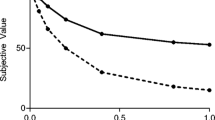Abstract
Individuals with ADHD often display an altered response to delay. To date, assessment of this has typically involved neuropsychological testing—however, such tests are designed specifically for children and may not be suitable for adults. They are also relatively time-consuming and expensive. In the current paper, we describe the initial validation of a short questionnaire to assess delay-related behaviour in adults. The Quick Delay Questionnaire (QDQ) is a 10-item scale. The questionnaire was administered to 575 participants from the normal population (ranging in age from 18 to 77 years). Forty of the original sample were selected at random and tested 1 week later. Data on ADHD, anxiety and depression were also collected. There were two five-item scales—(1) delay aversion; and (2) delay discounting. These had internal consistency and had good reliability. Subscales were differentially associated with ADHD, anxiety and depression. The QDQ is a potentially valuable way of assessing response to delay in adults. Further work is required to validate the scale against direct observation and neuropsychological assessment in clinically ascertained samples.
Similar content being viewed by others
References
Aase H, Sagvolden T (2006) Infrequent, but not frequent, reinforcers produce more variable responding and deficient sustained attention in young children with attention-deficit/hyperactivity disorder (ADHD). J Child Psychol Psychiatry 47:457–471
Antrop I, Roeyers H, Van Oost P, Buysse A (2003) Stimulation seeking and hyperactivity in children with ADHD. J Child Psychol Psychiatry 41:225–231
Barkley RA, Murphy KR (1998) Attention deficit hyperactivity disorder—a clinical workbook, 2nd edn. The Guildford Press, London
Barkley RA, Edwards G, Laneri M, Fletcher K, Metevia L (2001) Executive functioning, temporal discounting, and sense of time in adolescents with attention deficit hyperactivity disorder (ADHD) and oppositional defiant disorder (ODD). J Abn Child Psychol 29:541–556
Bidwell LC, Willcutt EG, DeFries JC, Pennington BF (2007) Testing for neuropsychological endophenotypes in siblings discordant to attention deficit/hyperactivity disorder. Biol Psychiatry 62:991–998
Bitsakou P, Antrop I, Wiersema R, Sonuga-Barke EJS (2006) Probing the limits of delay intolerance: preliminary young adult data from the delay frustration task (DeFT). J Neurosci Meth 151:38–44
Bitsakou P, Psychogiou L, Thompson M, Sonuga-Barke E (2009) Delay aversion in attention deficit/hyperactivity disorder: an empirical investigation of the broader phenotype. Neuropsychologia 47:446–456
Faraone SV, Biederman J, Mick E (2006) The age-dependent decline of attention deficit hyperactivity disorder: a meta-analysis of follow-up studies. Psychol Med 36:159–165
Green L, Myerson J, Lichtman D, Rosen S, Fry AF (1996) Temporal discounting in choice between delayed rewards: the role of age and income. Psychol Aging 11:79–84
Marco R, Miranda A, Schlotz W, Melia A, Mulligan A, Müller U, Andreou P, Butler L, Christiansen H, Gabriels I, Medad S, Albrecht B, Uebel H, Asherson P, Banaschewski T, Gill M, Kuntsi J, Manor I, Mulas F, Oades R, Roeyers H, Steinhausen HC, Rothenberger A, Faraone SV, Sonuga-Barke EJS (2009) Delay and reward choice in ADHD: an experimental test of the role of delay aversion. Neuropsychol 23:367–380
Nigg JT, Willcutt EG, Doyle AE, Sonuga-Barke EJ (2005) Causal heterogeneity in attention-deficit/hyperactivity disorder: do we need neuropsychologically impaired subtypes? Biol Psychiatry 57:1224–1230
Nutt DJ, Fone K, Asherson P, Bramble D, Hill P, Matthews K et al (2007) Evidence-based guidelines for management of attention-deficit/hyperactivity disorder in adolescents in transition to adult services and in adults: recommendations from the British association for psychopharmocology. J Psychopharmocol 21:10–41
Pallant JF, Tennant A (2007) An introduction to the rasch measurement model: an example using the hospital anxiety and depression scale (HADS). Br J Clin Psychol 46:1–18
Sagvolden T, Aase H, Zeiner P, Berger D (1998) Altered reinforcement mechanisms in attention-deficit/hyperactivity disorder. Behav Brain Res 4:61–71
Scheres A, Dijkstra M, Ainslie E, Balkan J, Reynolds B, Sonuga-Barke E, Castellanos FX (2006) Temporal and probabilistic discounting of rewards in children and adolescents: effects of age and ADHD symptoms. Neuropsychologia 44:2092–2103
Schoechlin C, Engel RR (2005) Neuropsychological performance in adult attention-deficit hyperactivity disorder: meta-analysis of empirical data. Arch Clin Neuropsychol 20:727–744
Scime N, Norvilitis JM (2006) Task performance and response to frustration in children with attention deficit hyperactivity disorder. Psychol schools 43:377–386
Sonuga-Barke EJ (1994) Annotation: on dysfunction and function in psychological theories of childhood disorder. J Child Psychol Psychiatry 35:801–815
Sonuga-Barke EJS, Halperin JM (2009) Developmental phenotypes and causal pathways in attention deficit/hyperactivity disorder: potential targets for early intervention? J Child Psychol Psychiatry. doi:10.1111/j.1469-7610.2009.02195.x
Sonuga-Barke EJS, De Houwer J, De Ruiter K, Ajzenstzen M, Holland S (2004) AD/HD and the capture of attention by briefly exposed delay-related cues: evidence from a conditioning paradigm. J Child Psychol Psychiatry 45:274–283
Sonuga-Barke EJS, Sergeant S, Nigg J, Willcutt E (2008) Executive dysfunction and delay aversion in ADHD: nosological and diagnostic implications. N Am Clin Child Adolesc Psychiatry 17:367–384
Spencer TJ, Biederman J, Mick E (2007) Attention-deficit/hyperactivity disorder: diagnosis, lifespan, comorbidities, and neurobiology. J Ped Psychol 32:631–642
Tripp G, Alsop B (2001) Sensitivity to reward delay in children with attention deficit hyperactivity disorder (ADHD). J Child Psychol Psychiatry 42:691–698
Willcutt EG, Sonuga-Barke EJS, Nigg JT, Sergeant JA (2008) Recent developments in neuropsychological models of childhood psychiatric disorders. In: Banaschewski T, Rhode LA (eds) Biological child psychiatry. Recent trends and developments. Advances in biological psychiatry. Karger, Basel
Wulfert E, Block JA, Santa Ana E, Rodriguez ML, Colsman M (2002) Delay of gratification: impulsive choices and problem behaviors in early and late adolescence. J Personality 70:533–552
Zigmond AS, Snaith RP (1983) The hospital anxiety and depression scale. Acta Psychiatrica Scandinavica 67:361–370
Author information
Authors and Affiliations
Corresponding author
Rights and permissions
About this article
Cite this article
Clare, S., Helps, S. & Sonuga-Barke, E.J.S. The quick delay questionnaire: a measure of delay aversion and discounting in adults. ADHD Atten Def Hyp Disord 2, 43–48 (2010). https://doi.org/10.1007/s12402-010-0020-4
Received:
Accepted:
Published:
Issue Date:
DOI: https://doi.org/10.1007/s12402-010-0020-4




